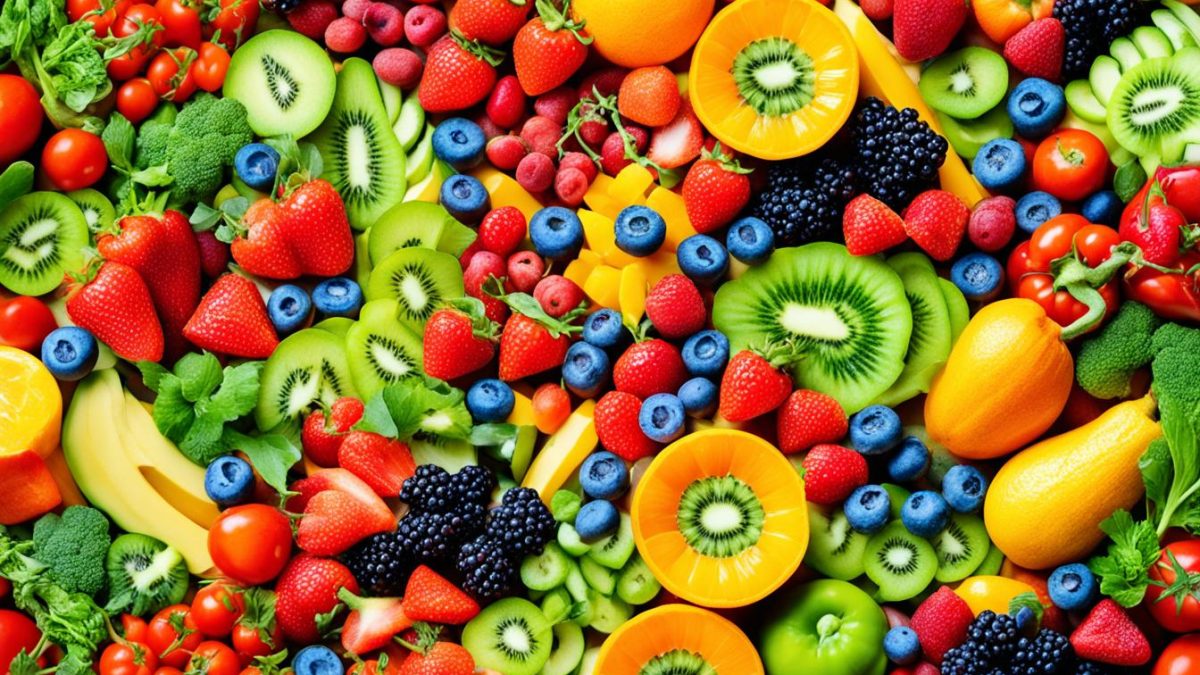
Top 5 Essential Vitamins for Optimal Eye Health in Extreme Heat
Maintaining your eye health is very important, especially when it’s hot outside. Did you know that overexposure to UV rays in hot weather can increase the risk of eye damage and vision problems? Fortunately, you can keep your eyes safe with the right vitamins and nutrients. In this article, we’ll look at the top 5 vitamins good for your eyes in hot weather.
These vitamins can help your eyes fight off UV damage and stress. They also provide your eyes with important nutrients. We’ll also share some tips to keep your eyes healthy in the summer. So, let’s find out how these vitamins can benefit your eyes and the best foods to get them from.
Key Takeaways:
- Extreme heat can increase the risk of eye damage and vision problems.
- The right vitamins and nutrients can help protect your eyes and support overall eye wellness.
- Incorporating the top 5 essential vitamins into your diet can safeguard your eyes from UV damage and combat oxidative stress.
- Summer eye health tips can further enhance your eye health and protect your vision in extreme heat.
- By prioritizing eye health and incorporating these essential vitamins, you can enjoy clear vision and optimal eye health, even in extreme heat conditions.
The Critical Role of Nutrition in Eye Health Management
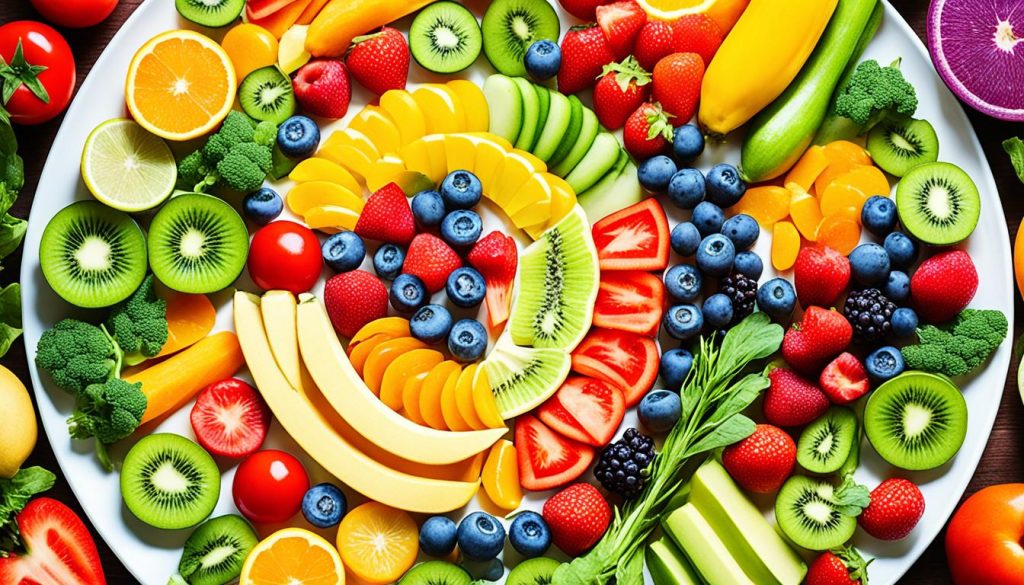
A healthy diet is crucial for good eyesight. Eating foods rich in vitamins and antioxidants helps our eyes stay healthy. These nutrients fight off eye diseases and keep our vision sharp. So, what we eat matters a lot for our eyes.
How Diet Influences Vision and Eye Health
Your diet affects how well you see and the health of your eyes. Eating the right foods helps your eyes work well. For instance, vitamins A, C, and E, plus minerals like zinc, help your eyes stay strong and ward off damage.
Omega-3s are good for your eyes too. They help your retinas, make enough tears, and stop your eyes from feeling dry. Adding these nutrients to your meals keeps your eyes healthy.
The Impact of Antioxidants on Ocular Cells
Antioxidants protect our eye cells from harm by free radicals. They’re key in keeping our eyes from conditions like macular degeneration and cataracts. Eating foods high in antioxidants lowers these risks and keeps your eyes in good shape.
Vitamins C and E, and carotenoids like lutein and zeaxanthin, help too. They fight off free radicals and lower inflammation. These are in many fruits, veggies, and leafy greens. So, eat plenty of these to help your eyes.
Remember, eating well is very important for your eyes. But, it doesn’t replace regular eye check-ups and doctor’s advice. Talk to an eye doctor to make sure you’re doing all you can for your eye health.
Protecting Your Eyes from UV Damage with the Right Vitamins

It’s crucial to shield your eyes from UV damage. This is especially true in hot weather. Vitamin A is key for good vision and guards the cornea. It’s known as the cornerstone of eye health. Vitamin A boosts your ability to see in dim light and prevents night blindness.
Many people link Vitamin A to carrots. But, there are lots of other foods rich in this nutrient. Eating these foods can help keep your eyes safe from UV harm. They also support clear vision, even when it’s really hot.
Vitamin A: The Cornerstone of Eye Health
Vitamin A is vital for eye health. It helps keep the cornea, the eye’s clear front part, healthy. It also aids in making rhodopsin, a pigment essential for seeing in dim light and at night. Vitamin A is great for preventing dry eyes and making your eyes feel good overall.
Beyond Carrots: Rich Sources of Vitamin A
Carrots aren’t the only source of vitamin A. There are many foods you can eat to get enough of this nutrient. Eating a wide range of these foods helps keep your eyes in top shape. Some foods high in vitamin A are:
| Food Source | Vitamin A Content (per serving) |
|---|---|
| Sweet potatoes | 1 medium sweet potato: 450% of the Daily Value (DV) |
| Spinach | 1 cup cooked: 377% of the DV |
| Kale | 1 cup cooked: 419% of the DV |
| Mangoes | 1 cup sliced: 36% of the DV |
| Red bell peppers | 1 medium pepper: 92% of the DV |
Clearly, many foods are rich in vitamin A. Adding these to your meals, plus other nutrients for your eyes, supports great eye health. It fights off UV damage, too.
Combatting Oxidative Stress: Antioxidants for Your Eyes
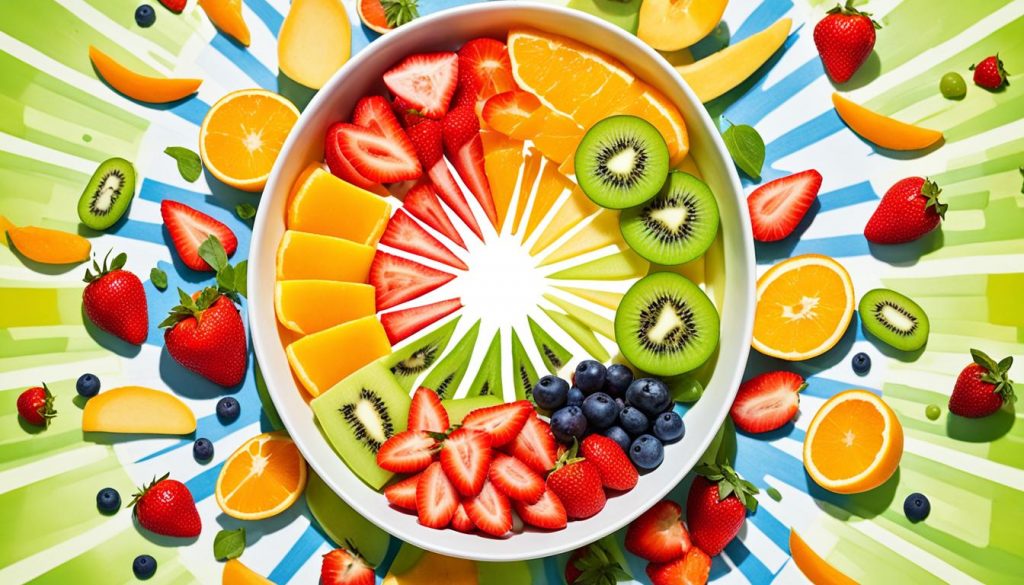
Oxidative stress can harm your eyes and lead to eye diseases as you get older. Antioxidants help fight this stress and keep your eye cells safe. Vitamin C, known as “Vitamin See,” is a strong antioxidant. It defends your eyes against free radicals and keeps your blood vessels healthy.
Eating foods with a lot of vitamin C is good for your eyes. It fights oxidative stress. This is very important, especially when it’s very hot outside.
Why Vitamin C is Dubbed “Vitamin See”
Vitamin C is called “Vitamin See” because it’s so good for your eyes. As an antioxidant, it protects your eyes from damage by free radicals. These can cause eye problems.
It also keeps your blood vessels, including those in your eyes, healthy. This supports better blood flow and keeps your eyes well.
Foods that Provide a Healthy Dose of Vitamin C
Many foods are high in vitamin C and are great for your eyes. Some of these include:
- Oranges
- Strawberries
- Kiwi
- Bell peppers
- Broccoli
- Kale
- Papaya
- Guava
Adding these foods to your meals is a tasty way to help your eyes. They fight oxidative stress and protect your vision. Be sure to eat them to benefit from their antioxidants.
Vitamin E: A Shield Against Age-Related Damage
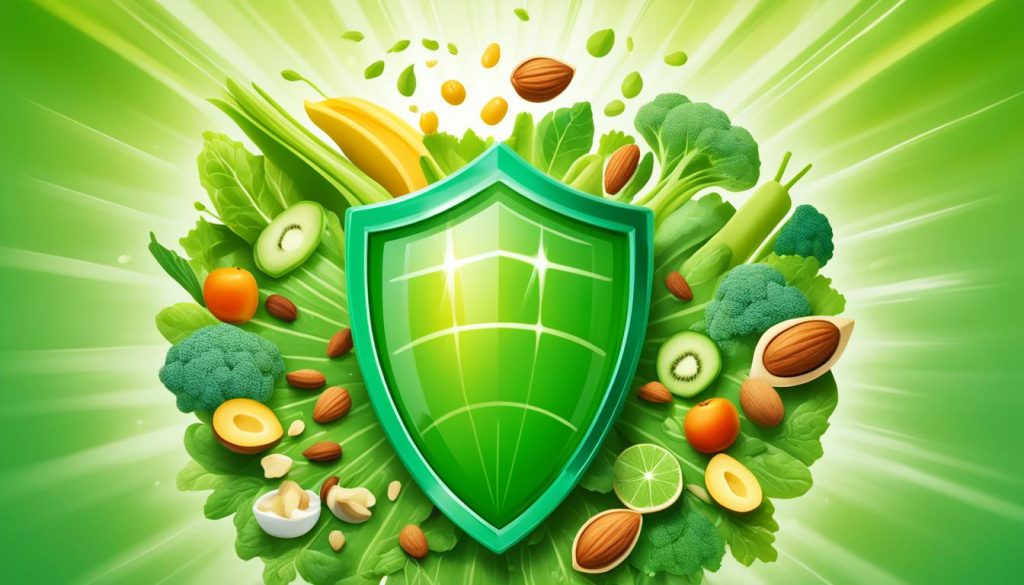
As we age, our eyes can suffer in high heat. Vitamin E works as a shield against this harm. It keeps our eyes healthy by fighting off damage caused by harmful substances. These can lead to serious eye diseases like cataracts and macular degeneration.
Eating foods rich in vitamin E is a great way to protect your eyes. It helps fight the effects of aging, making sure you see clearly, even in extreme heat.
Zinc: Essential Mineral for Visual Sharpness
Zinc is crucial for keeping our eyes sharp and safe. It takes part in many processes that help our eyes stay healthy and work well.
Role of Zinc in Melanin Production for Eye Protection
Zinc helps make melanin, a natural shield against the sun’s UV rays. This reduces the risk of eye problems from too much sun. Zinc plays a big part in keeping our eyes safe.
Identifying Zinc-Rich Foods for Daily Consumption
Eating foods rich in zinc daily is great for your eyes. It ensures you get enough of this vital mineral. Here are some zinc-rich foods to add to your diet:
- Oysters
- Beef
- Pork
- Chicken
- Spinach
- Pumpkin seeds
- Beans
- Nuts
Adding these foods to your meals helps give your eyes the nutrition they need. It keeps your eyes sharp and guards against UV damage.
Omega-3 Fatty Acids: Key Nutrients for Retinal Health
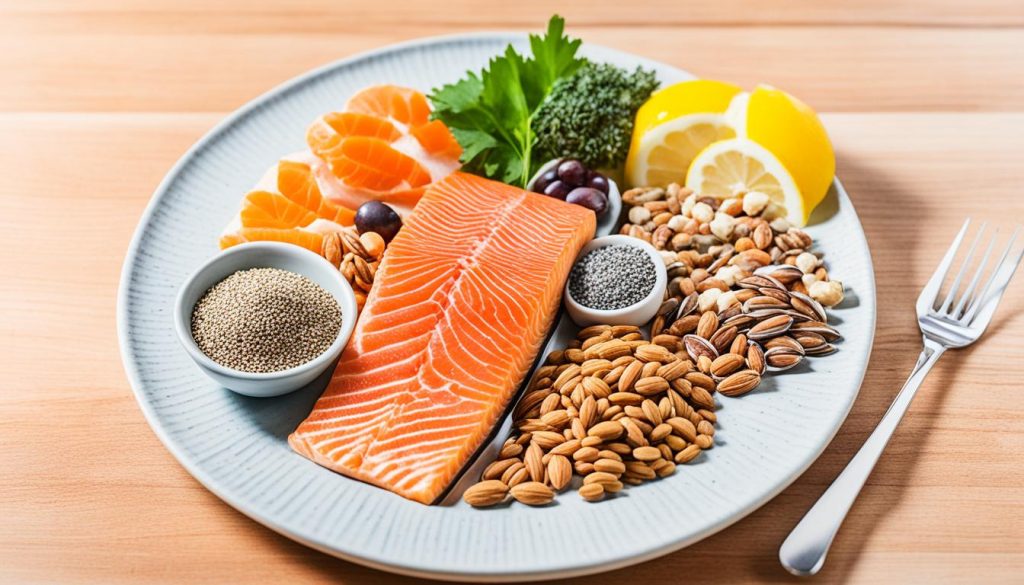
Omega-3 fatty acids play a vital role in maintaining eye health. They are especially good for the retina. In the omega-3 group, DHA and EPA shine for their benefits.
DHA is essential for the retina’s health. It ensures retinal cells stay healthy and helps with seeing light. EPA, on the other hand, fights inflammation. This makes it great for keeping your eyes healthy.
Eating foods high in omega-3 can do wonders for your eyes. Fish like salmon, mackerel, and sardines are top choices. You can also get omega-3 from plants like flaxseeds, chia seeds, and walnuts. Adding these foods to your meals gives your eyes the care they need.
| Food Source | Omega-3 Fatty Acid Content |
|---|---|
| Salmon | 1,210-2,260 mg per 100g |
| Mackerel | 4,107 mg per 100g |
| Sardines | 2,205 mg per 100g |
| Flaxseeds | 22,813 mg per 100g |
| Chia Seeds | 17,552 mg per 100g |
| Walnuts | 2,542 mg per 100g |
Nurturing Your Eyes with Carotenoids: Lutein and Zeaxanthin
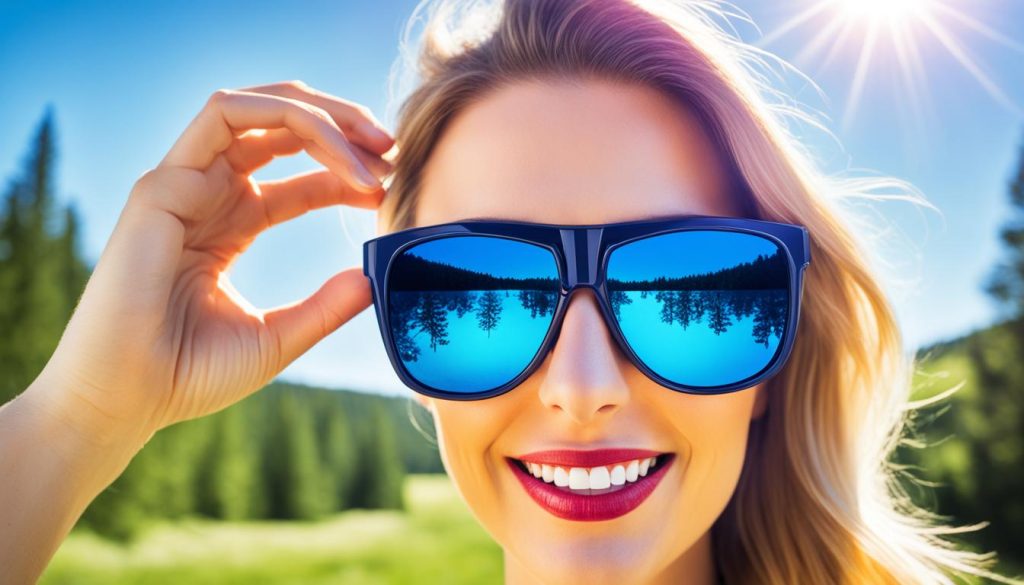
Taking care of your eyes with lutein and zeaxanthin can greatly help. They cut the chance of getting eye problems like age-related macular degeneration and cataracts.
Reduced Risk of Chronic Eye Diseases with Leafy Greens
Leafy greens contain lots of lutein and zeaxanthin. These nutrients are key for keeping your eyes in top shape. Eating spinach, kale, and collard greens can lower your risk of eye diseases.
Mechanisms Behind Blue Light Filtration and Eye Health
Lutein and zeaxanthin are critical for blocking blue light from screens. They work together to keep your eyes from getting tired and protect your vision in this digital era.
Knowing how lutein and zeaxanthin filter blue light is essential. Adding more greens to your meals shields your eyes against harmful rays. This simple step can keep your eyes healthy for a long time.
Summer Eye Health Tips: Protecting Your Vision in Extreme Heat
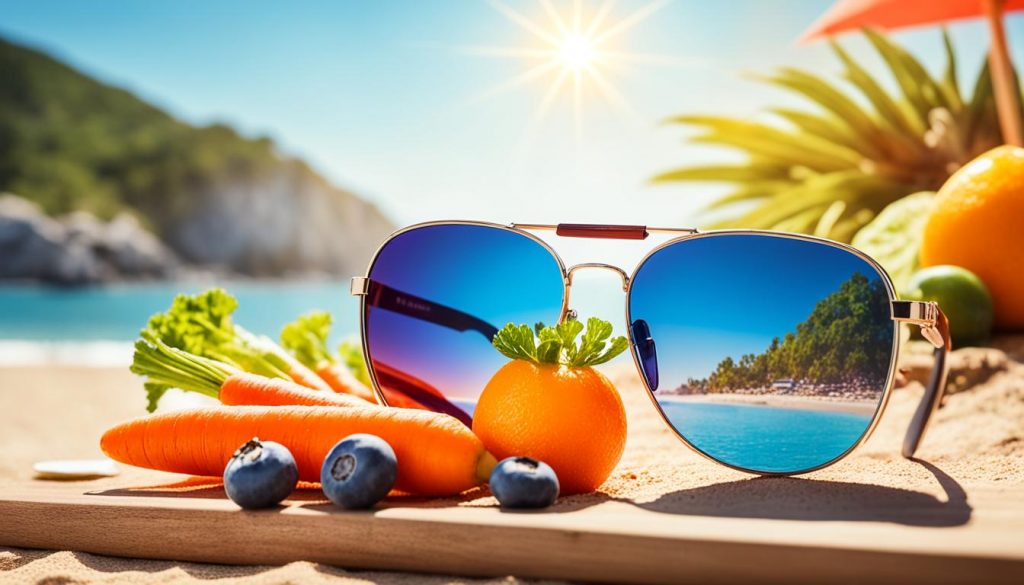
As it gets hotter, taking good care of your eyes is key to keeping your vision clear. To protect your eyes in extreme heat, follow these summer eye health tips:
- Stay hydrated: Drinking lots of water is good for your whole body, including your eyes. It keeps your eyes moist and stops them from getting dry.
- Wear UV-protective sunglasses: Always wear sunglasses outside. Pick ones that block UV rays to keep your eyes safe from damage.
- Use lubricating eye drops: In hot weather, your eyes might feel dry and scratchy. Eye drops can make them feel better and prevent dryness.
- Take breaks from screens: Too much screen time can tire your eyes out. Remember the 20-20-20 rule: look at something far away for 20 seconds every 20 minutes.
These easy-to-follow tips can help keep your eyes healthy in the summer. Make sure to look after your eyes in hot weather. This way, you can enjoy the season with clear vision.
Conclusion
Maintaining your eye health in hot weather is very important. You should eat foods rich in certain vitamins and minerals. These include vitamin A, vitamin C, vitamin E, zinc, and omega-3 fatty acids.
These nutrients help fight UV damage and support eye health. Vitamin A protects your cornea and improves night vision. Vitamin C fights off harmful free radicals as an antioxidant. Vitamin E guards against age-related eye issues. Zinc keeps your vision sharp. Lastly, omega-3 fatty acids are important for your retina and prevent dry eyes.
Eating foods with carotenoids like lutein and zeaxanthin is also good. Plants like leafy greens that are high in carotenoids can lower the chance of eye diseases. They also filter harmful blue light. Plus, follow tips like drinking enough water and wearing sunglasses with UV protection to keep your eyes safe.
By focusing on eye health and getting these essential nutrients, you’ll have healthy eyes. Even during hot weather, you can keep your vision clear. Always talk to a doctor or eye specialist for the best advice on your eye health.



